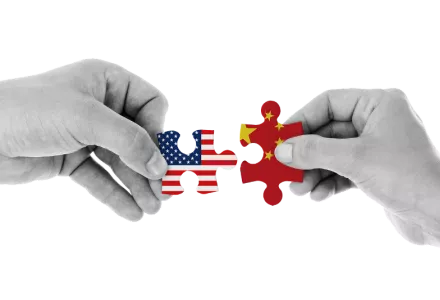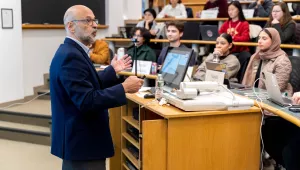Speakers: Thomas J. Christensen, Professor of Political Science and Director,The China and the World Program, Columbia University); Evelyn Goh, Shedden Professor of Strategic Policy Studies and Research Director, Strategic & Defence Studies Centre, Australian National University; and Yasheng Huang, Epoch Foundation Professor of International Management and Faculty Director, Action Learning, MIT Sloan School of Management.
Moderator: Stephen M. Walt, Robert & Renée Belfer Professor of International Relations, Harvard Kennedy School
The existing global political-economic order has been ruptured by the rise of China, a broad backlash against globalization, uncertainties about the U.S. commitment to a rules-based system, and most recently, the Covid-19 pandemic. What form(s) might a future world order take, and what principles should guide efforts to construct it?
Relations between the United States and China—by far the two strongest states in the system—will play a central role in determining the shape of any future world order. The participants in this online webinar will discuss and respond to a recent paper on the future world order by Dani Rodrik and Stephen Walt (available here) and consider whether the framework presented in the paper could help guide how Washington and Beijing deal with each other. In particular, the discussion will address questions such as these:
1. Could the United States and China agree to completely prohibit certain policy steps, in order to stabilize their economic and political relations and reduce the risk of serious conflict?
2. What are the prospects for formal or informal agreements based on mutual adjustments, in which each side agreed to alter its behavior in exchange for parallel concessions by the other?
3. If outright bans and/or mutual adjustments cannot be reached, could the United States and China protect their interests through "well-calibrated" policy responses designed to mitigate damage from the other’s actions, but which did not seek to escalate the conflict or gain unilateral advantage?
4. Which aspects of Sino-American relations require a multilateral approach (involving third parties), as opposed to purely bilateral agreements or unilateral acts of restraint?
Everyone is welcome to join us via Zoom! Register in advance for this meeting:
https://harvard.zoom.us/meeting/register/tJ0qd-mhrz0pE9K_7GElJAKyLNi5L7Y_WpcJ




